Analyzing COVID-19: Sociological Perspectives Essay, University Name
VerifiedAdded on 2022/09/08
|6
|1459
|20
Essay
AI Summary
This essay provides a sociological analysis of the COVID-19 pandemic, examining its impact on global health and social structures. It begins by acknowledging the pandemic's emergence and the World Health Organization's recommendations, focusing on prevention, preparedness, and public health. The essay explores sociological perspectives, including the reactions of societies such as fear, panic, and stigmatization. It then delves into Philip Strong's Actor Network Theory to explain societal responses to the pandemic, including the disruption of daily routines through social isolation and lockdowns. The essay also discusses the three types of psycho-social epidemics: moralization and stigmatization, fear, and adaptive reactions. Finally, it concludes by summarizing the sociological perspectives and emphasizing the need for further study on the topic.
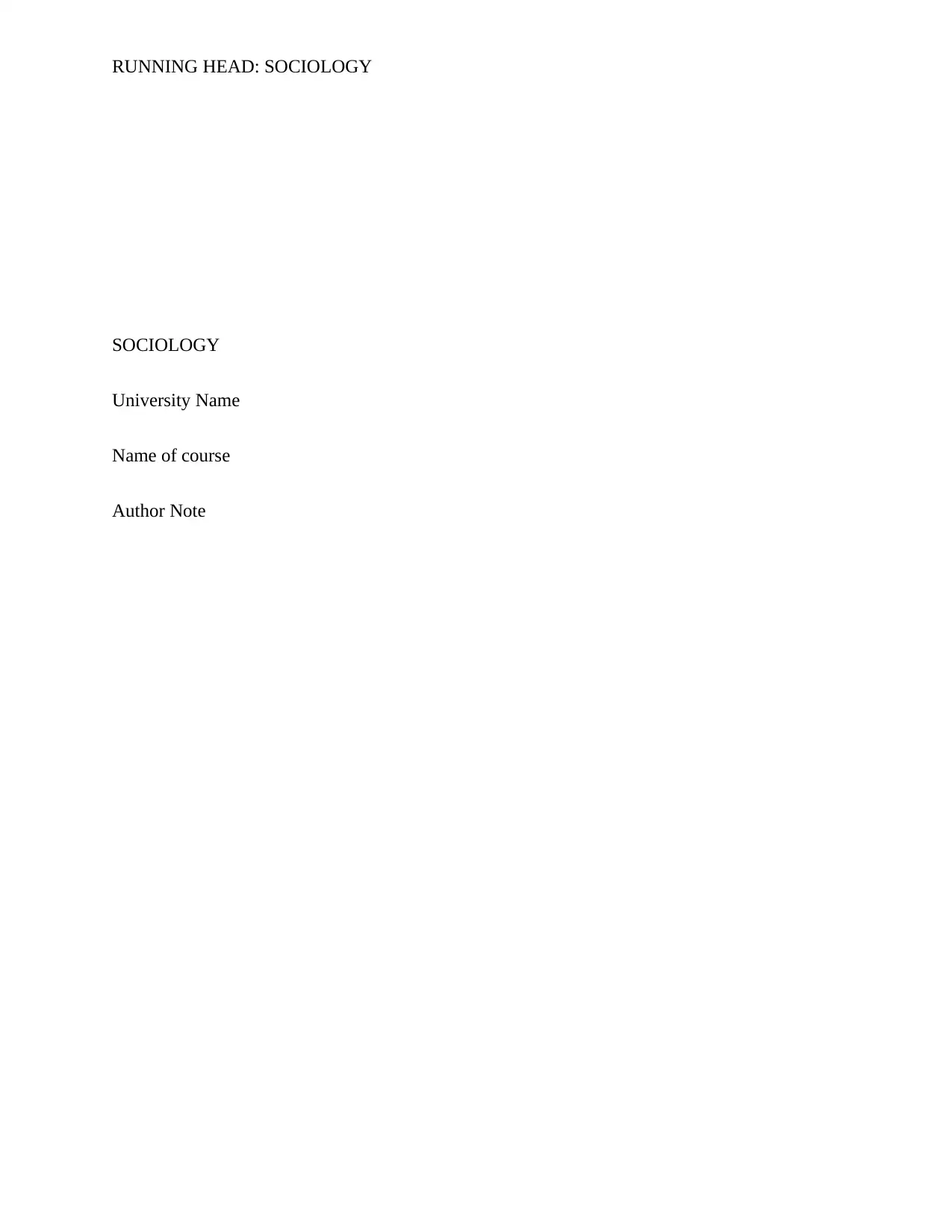
RUNNING HEAD: SOCIOLOGY
SOCIOLOGY
University Name
Name of course
Author Note
SOCIOLOGY
University Name
Name of course
Author Note
Paraphrase This Document
Need a fresh take? Get an instant paraphrase of this document with our AI Paraphraser
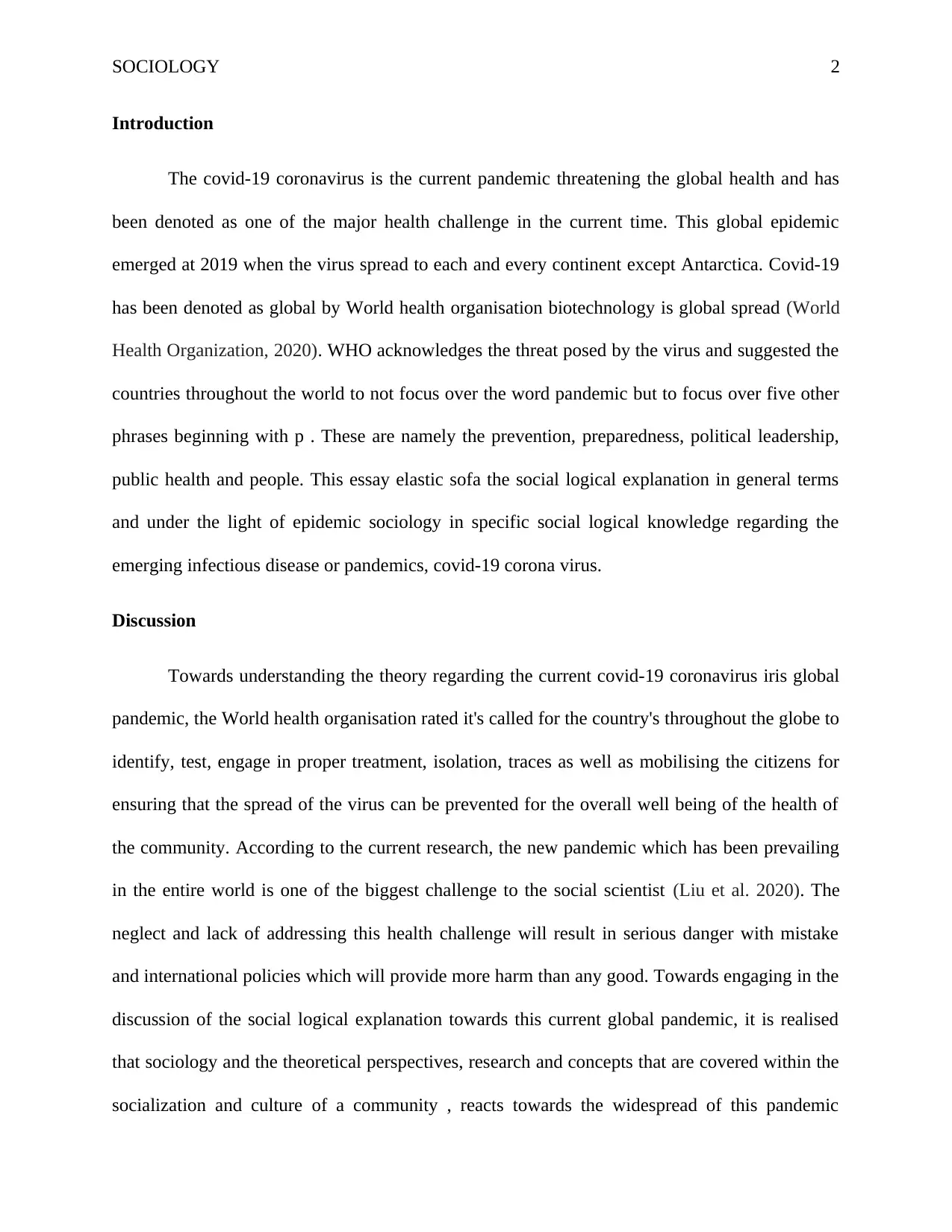
SOCIOLOGY 2
Introduction
The covid-19 coronavirus is the current pandemic threatening the global health and has
been denoted as one of the major health challenge in the current time. This global epidemic
emerged at 2019 when the virus spread to each and every continent except Antarctica. Covid-19
has been denoted as global by World health organisation biotechnology is global spread (World
Health Organization, 2020). WHO acknowledges the threat posed by the virus and suggested the
countries throughout the world to not focus over the word pandemic but to focus over five other
phrases beginning with p . These are namely the prevention, preparedness, political leadership,
public health and people. This essay elastic sofa the social logical explanation in general terms
and under the light of epidemic sociology in specific social logical knowledge regarding the
emerging infectious disease or pandemics, covid-19 corona virus.
Discussion
Towards understanding the theory regarding the current covid-19 coronavirus iris global
pandemic, the World health organisation rated it's called for the country's throughout the globe to
identify, test, engage in proper treatment, isolation, traces as well as mobilising the citizens for
ensuring that the spread of the virus can be prevented for the overall well being of the health of
the community. According to the current research, the new pandemic which has been prevailing
in the entire world is one of the biggest challenge to the social scientist (Liu et al. 2020). The
neglect and lack of addressing this health challenge will result in serious danger with mistake
and international policies which will provide more harm than any good. Towards engaging in the
discussion of the social logical explanation towards this current global pandemic, it is realised
that sociology and the theoretical perspectives, research and concepts that are covered within the
socialization and culture of a community , reacts towards the widespread of this pandemic
Introduction
The covid-19 coronavirus is the current pandemic threatening the global health and has
been denoted as one of the major health challenge in the current time. This global epidemic
emerged at 2019 when the virus spread to each and every continent except Antarctica. Covid-19
has been denoted as global by World health organisation biotechnology is global spread (World
Health Organization, 2020). WHO acknowledges the threat posed by the virus and suggested the
countries throughout the world to not focus over the word pandemic but to focus over five other
phrases beginning with p . These are namely the prevention, preparedness, political leadership,
public health and people. This essay elastic sofa the social logical explanation in general terms
and under the light of epidemic sociology in specific social logical knowledge regarding the
emerging infectious disease or pandemics, covid-19 corona virus.
Discussion
Towards understanding the theory regarding the current covid-19 coronavirus iris global
pandemic, the World health organisation rated it's called for the country's throughout the globe to
identify, test, engage in proper treatment, isolation, traces as well as mobilising the citizens for
ensuring that the spread of the virus can be prevented for the overall well being of the health of
the community. According to the current research, the new pandemic which has been prevailing
in the entire world is one of the biggest challenge to the social scientist (Liu et al. 2020). The
neglect and lack of addressing this health challenge will result in serious danger with mistake
and international policies which will provide more harm than any good. Towards engaging in the
discussion of the social logical explanation towards this current global pandemic, it is realised
that sociology and the theoretical perspectives, research and concepts that are covered within the
socialization and culture of a community , reacts towards the widespread of this pandemic
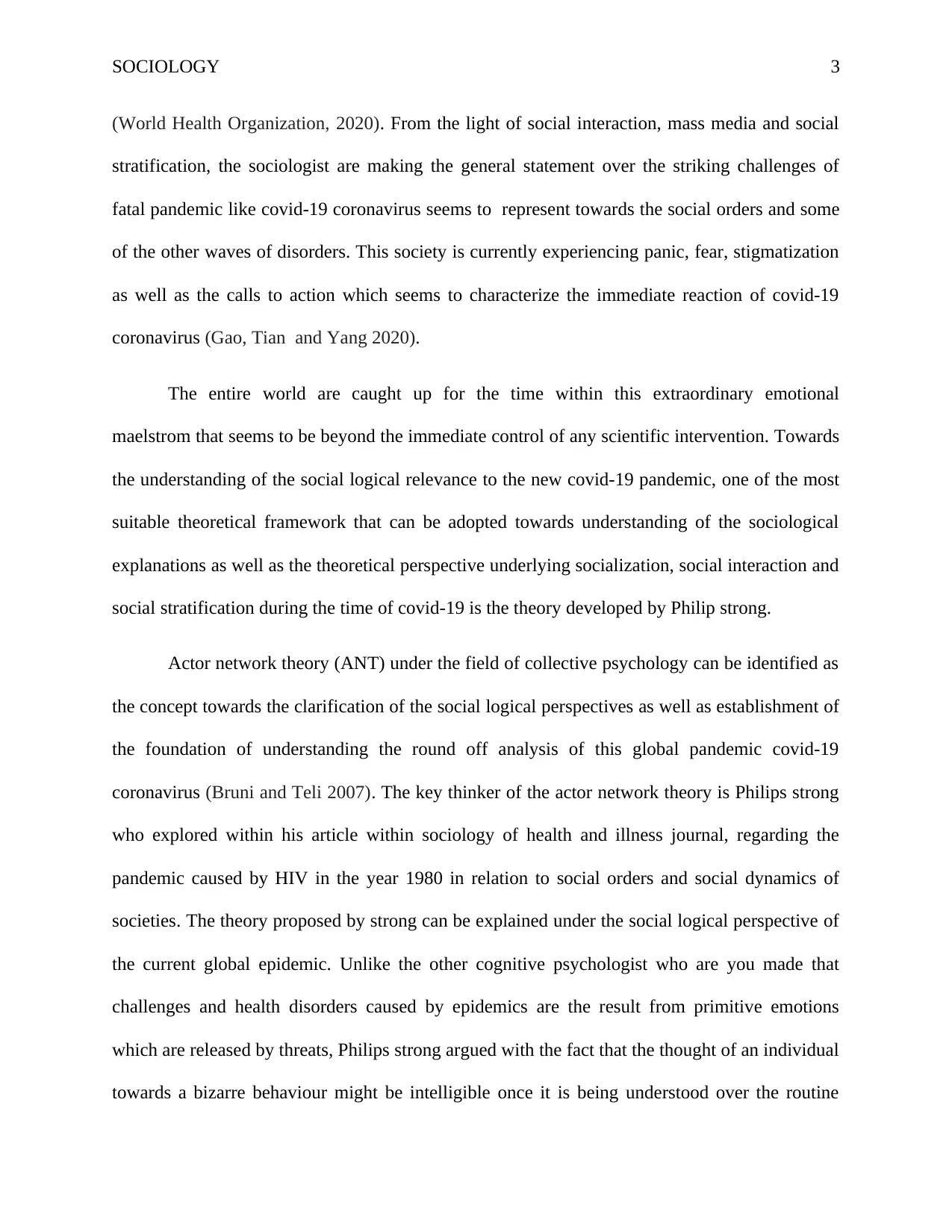
SOCIOLOGY 3
(World Health Organization, 2020). From the light of social interaction, mass media and social
stratification, the sociologist are making the general statement over the striking challenges of
fatal pandemic like covid-19 coronavirus seems to represent towards the social orders and some
of the other waves of disorders. This society is currently experiencing panic, fear, stigmatization
as well as the calls to action which seems to characterize the immediate reaction of covid-19
coronavirus (Gao, Tian and Yang 2020).
The entire world are caught up for the time within this extraordinary emotional
maelstrom that seems to be beyond the immediate control of any scientific intervention. Towards
the understanding of the social logical relevance to the new covid-19 pandemic, one of the most
suitable theoretical framework that can be adopted towards understanding of the sociological
explanations as well as the theoretical perspective underlying socialization, social interaction and
social stratification during the time of covid-19 is the theory developed by Philip strong.
Actor network theory (ANT) under the field of collective psychology can be identified as
the concept towards the clarification of the social logical perspectives as well as establishment of
the foundation of understanding the round off analysis of this global pandemic covid-19
coronavirus (Bruni and Teli 2007). The key thinker of the actor network theory is Philips strong
who explored within his article within sociology of health and illness journal, regarding the
pandemic caused by HIV in the year 1980 in relation to social orders and social dynamics of
societies. The theory proposed by strong can be explained under the social logical perspective of
the current global epidemic. Unlike the other cognitive psychologist who are you made that
challenges and health disorders caused by epidemics are the result from primitive emotions
which are released by threats, Philips strong argued with the fact that the thought of an individual
towards a bizarre behaviour might be intelligible once it is being understood over the routine
(World Health Organization, 2020). From the light of social interaction, mass media and social
stratification, the sociologist are making the general statement over the striking challenges of
fatal pandemic like covid-19 coronavirus seems to represent towards the social orders and some
of the other waves of disorders. This society is currently experiencing panic, fear, stigmatization
as well as the calls to action which seems to characterize the immediate reaction of covid-19
coronavirus (Gao, Tian and Yang 2020).
The entire world are caught up for the time within this extraordinary emotional
maelstrom that seems to be beyond the immediate control of any scientific intervention. Towards
the understanding of the social logical relevance to the new covid-19 pandemic, one of the most
suitable theoretical framework that can be adopted towards understanding of the sociological
explanations as well as the theoretical perspective underlying socialization, social interaction and
social stratification during the time of covid-19 is the theory developed by Philip strong.
Actor network theory (ANT) under the field of collective psychology can be identified as
the concept towards the clarification of the social logical perspectives as well as establishment of
the foundation of understanding the round off analysis of this global pandemic covid-19
coronavirus (Bruni and Teli 2007). The key thinker of the actor network theory is Philips strong
who explored within his article within sociology of health and illness journal, regarding the
pandemic caused by HIV in the year 1980 in relation to social orders and social dynamics of
societies. The theory proposed by strong can be explained under the social logical perspective of
the current global epidemic. Unlike the other cognitive psychologist who are you made that
challenges and health disorders caused by epidemics are the result from primitive emotions
which are released by threats, Philips strong argued with the fact that the thought of an individual
towards a bizarre behaviour might be intelligible once it is being understood over the routine
⊘ This is a preview!⊘
Do you want full access?
Subscribe today to unlock all pages.

Trusted by 1+ million students worldwide
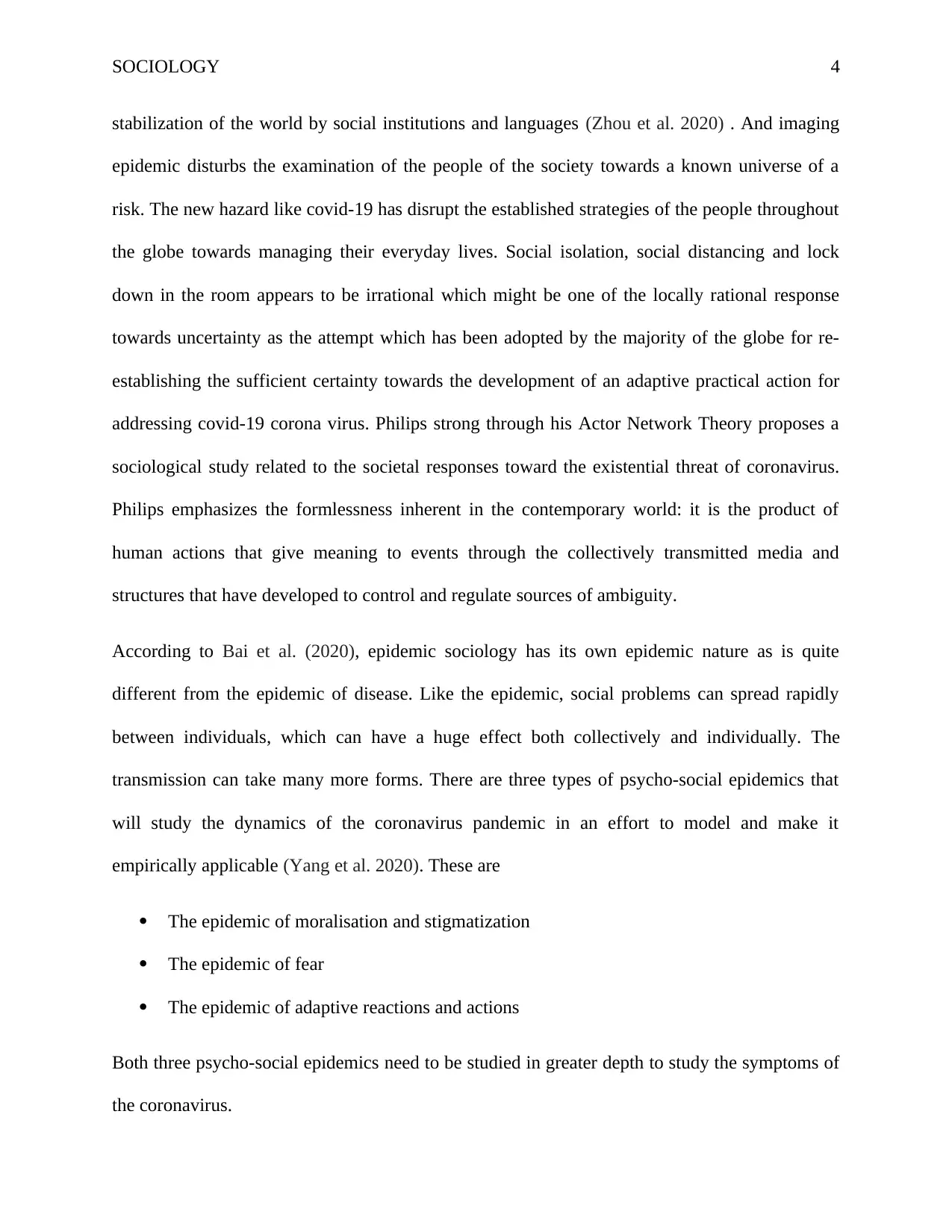
SOCIOLOGY 4
stabilization of the world by social institutions and languages (Zhou et al. 2020) . And imaging
epidemic disturbs the examination of the people of the society towards a known universe of a
risk. The new hazard like covid-19 has disrupt the established strategies of the people throughout
the globe towards managing their everyday lives. Social isolation, social distancing and lock
down in the room appears to be irrational which might be one of the locally rational response
towards uncertainty as the attempt which has been adopted by the majority of the globe for re-
establishing the sufficient certainty towards the development of an adaptive practical action for
addressing covid-19 corona virus. Philips strong through his Actor Network Theory proposes a
sociological study related to the societal responses toward the existential threat of coronavirus.
Philips emphasizes the formlessness inherent in the contemporary world: it is the product of
human actions that give meaning to events through the collectively transmitted media and
structures that have developed to control and regulate sources of ambiguity.
According to Bai et al. (2020), epidemic sociology has its own epidemic nature as is quite
different from the epidemic of disease. Like the epidemic, social problems can spread rapidly
between individuals, which can have a huge effect both collectively and individually. The
transmission can take many more forms. There are three types of psycho-social epidemics that
will study the dynamics of the coronavirus pandemic in an effort to model and make it
empirically applicable (Yang et al. 2020). These are
The epidemic of moralisation and stigmatization
The epidemic of fear
The epidemic of adaptive reactions and actions
Both three psycho-social epidemics need to be studied in greater depth to study the symptoms of
the coronavirus.
stabilization of the world by social institutions and languages (Zhou et al. 2020) . And imaging
epidemic disturbs the examination of the people of the society towards a known universe of a
risk. The new hazard like covid-19 has disrupt the established strategies of the people throughout
the globe towards managing their everyday lives. Social isolation, social distancing and lock
down in the room appears to be irrational which might be one of the locally rational response
towards uncertainty as the attempt which has been adopted by the majority of the globe for re-
establishing the sufficient certainty towards the development of an adaptive practical action for
addressing covid-19 corona virus. Philips strong through his Actor Network Theory proposes a
sociological study related to the societal responses toward the existential threat of coronavirus.
Philips emphasizes the formlessness inherent in the contemporary world: it is the product of
human actions that give meaning to events through the collectively transmitted media and
structures that have developed to control and regulate sources of ambiguity.
According to Bai et al. (2020), epidemic sociology has its own epidemic nature as is quite
different from the epidemic of disease. Like the epidemic, social problems can spread rapidly
between individuals, which can have a huge effect both collectively and individually. The
transmission can take many more forms. There are three types of psycho-social epidemics that
will study the dynamics of the coronavirus pandemic in an effort to model and make it
empirically applicable (Yang et al. 2020). These are
The epidemic of moralisation and stigmatization
The epidemic of fear
The epidemic of adaptive reactions and actions
Both three psycho-social epidemics need to be studied in greater depth to study the symptoms of
the coronavirus.
Paraphrase This Document
Need a fresh take? Get an instant paraphrase of this document with our AI Paraphraser
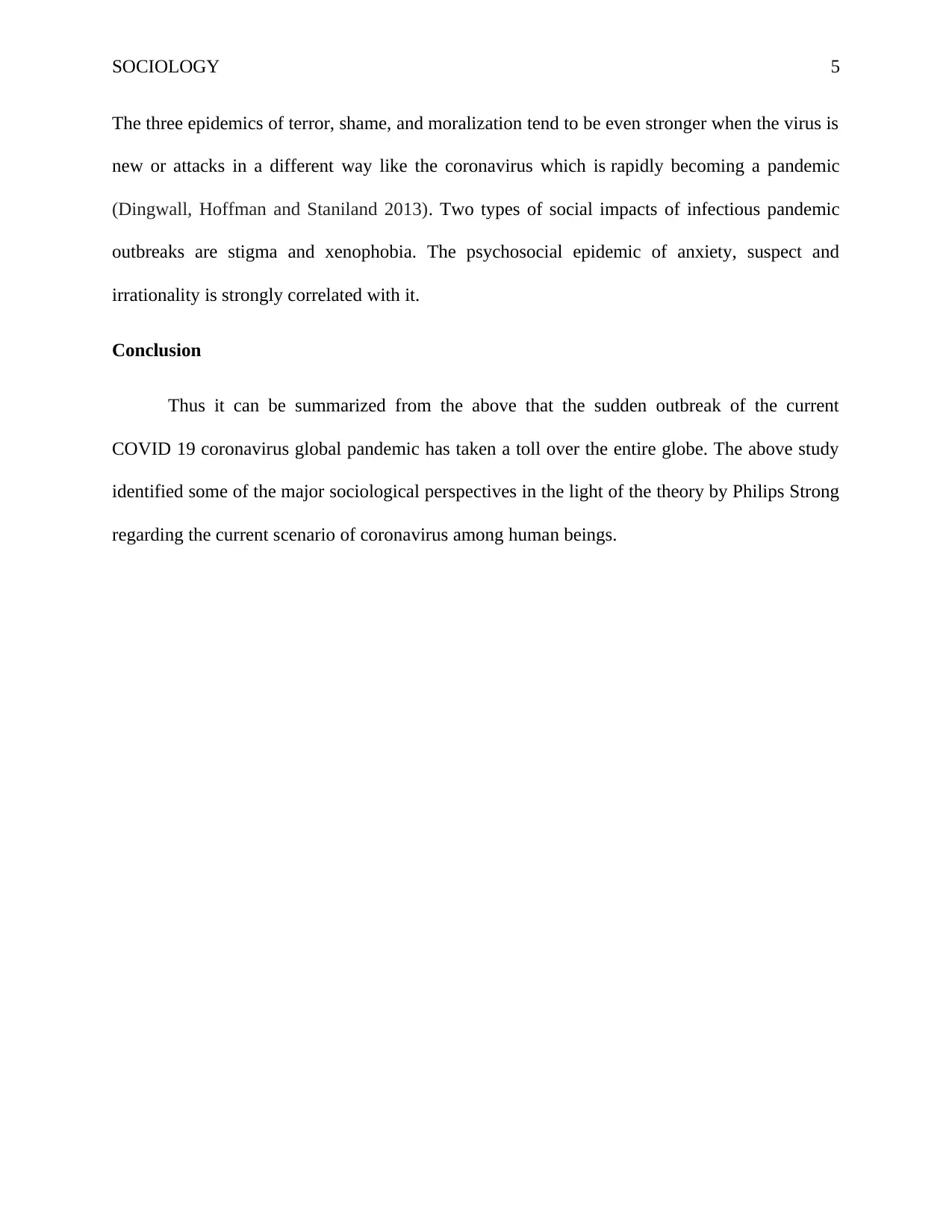
SOCIOLOGY 5
The three epidemics of terror, shame, and moralization tend to be even stronger when the virus is
new or attacks in a different way like the coronavirus which is rapidly becoming a pandemic
(Dingwall, Hoffman and Staniland 2013). Two types of social impacts of infectious pandemic
outbreaks are stigma and xenophobia. The psychosocial epidemic of anxiety, suspect and
irrationality is strongly correlated with it.
Conclusion
Thus it can be summarized from the above that the sudden outbreak of the current
COVID 19 coronavirus global pandemic has taken a toll over the entire globe. The above study
identified some of the major sociological perspectives in the light of the theory by Philips Strong
regarding the current scenario of coronavirus among human beings.
The three epidemics of terror, shame, and moralization tend to be even stronger when the virus is
new or attacks in a different way like the coronavirus which is rapidly becoming a pandemic
(Dingwall, Hoffman and Staniland 2013). Two types of social impacts of infectious pandemic
outbreaks are stigma and xenophobia. The psychosocial epidemic of anxiety, suspect and
irrationality is strongly correlated with it.
Conclusion
Thus it can be summarized from the above that the sudden outbreak of the current
COVID 19 coronavirus global pandemic has taken a toll over the entire globe. The above study
identified some of the major sociological perspectives in the light of the theory by Philips Strong
regarding the current scenario of coronavirus among human beings.
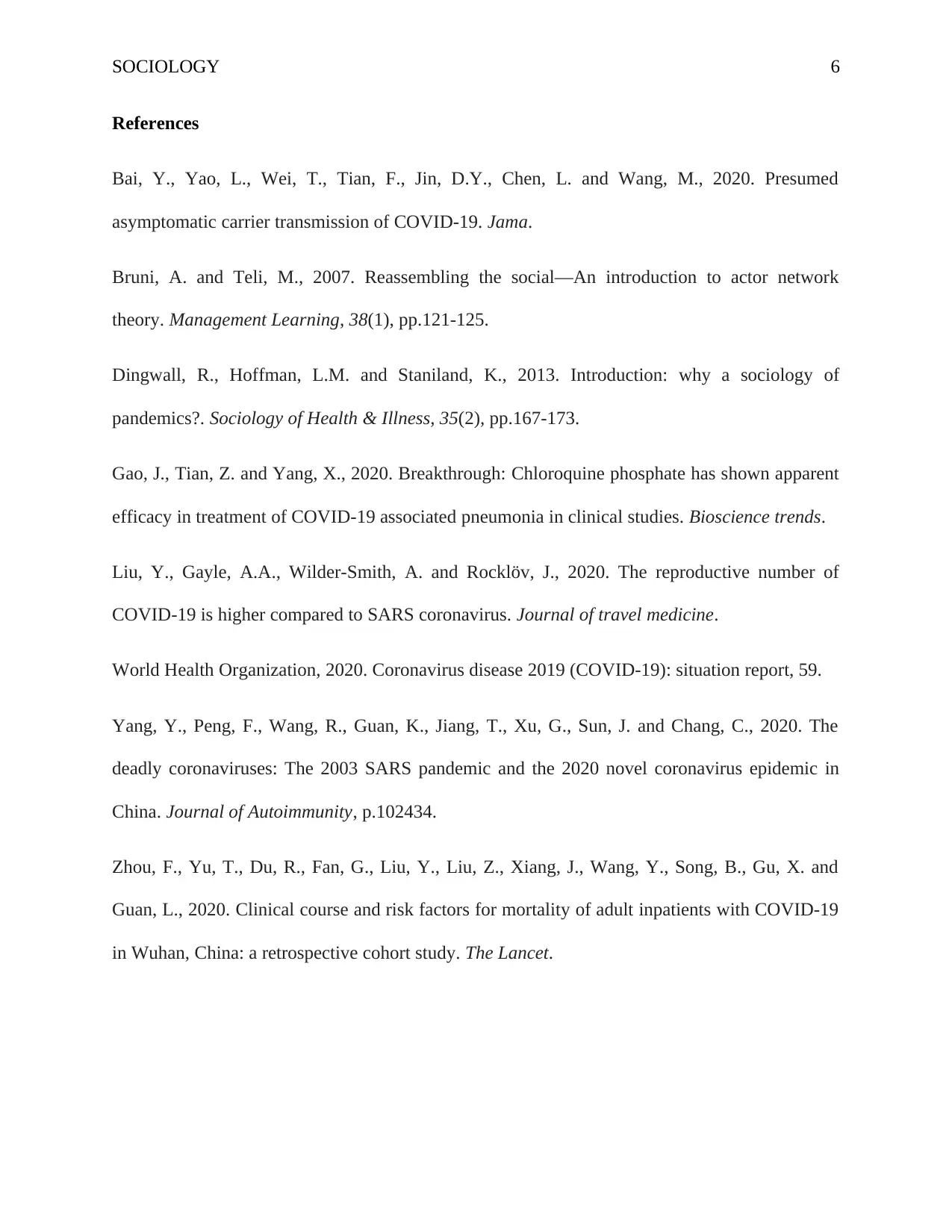
SOCIOLOGY 6
References
Bai, Y., Yao, L., Wei, T., Tian, F., Jin, D.Y., Chen, L. and Wang, M., 2020. Presumed
asymptomatic carrier transmission of COVID-19. Jama.
Bruni, A. and Teli, M., 2007. Reassembling the social—An introduction to actor network
theory. Management Learning, 38(1), pp.121-125.
Dingwall, R., Hoffman, L.M. and Staniland, K., 2013. Introduction: why a sociology of
pandemics?. Sociology of Health & Illness, 35(2), pp.167-173.
Gao, J., Tian, Z. and Yang, X., 2020. Breakthrough: Chloroquine phosphate has shown apparent
efficacy in treatment of COVID-19 associated pneumonia in clinical studies. Bioscience trends.
Liu, Y., Gayle, A.A., Wilder-Smith, A. and Rocklöv, J., 2020. The reproductive number of
COVID-19 is higher compared to SARS coronavirus. Journal of travel medicine.
World Health Organization, 2020. Coronavirus disease 2019 (COVID-19): situation report, 59.
Yang, Y., Peng, F., Wang, R., Guan, K., Jiang, T., Xu, G., Sun, J. and Chang, C., 2020. The
deadly coronaviruses: The 2003 SARS pandemic and the 2020 novel coronavirus epidemic in
China. Journal of Autoimmunity, p.102434.
Zhou, F., Yu, T., Du, R., Fan, G., Liu, Y., Liu, Z., Xiang, J., Wang, Y., Song, B., Gu, X. and
Guan, L., 2020. Clinical course and risk factors for mortality of adult inpatients with COVID-19
in Wuhan, China: a retrospective cohort study. The Lancet.
References
Bai, Y., Yao, L., Wei, T., Tian, F., Jin, D.Y., Chen, L. and Wang, M., 2020. Presumed
asymptomatic carrier transmission of COVID-19. Jama.
Bruni, A. and Teli, M., 2007. Reassembling the social—An introduction to actor network
theory. Management Learning, 38(1), pp.121-125.
Dingwall, R., Hoffman, L.M. and Staniland, K., 2013. Introduction: why a sociology of
pandemics?. Sociology of Health & Illness, 35(2), pp.167-173.
Gao, J., Tian, Z. and Yang, X., 2020. Breakthrough: Chloroquine phosphate has shown apparent
efficacy in treatment of COVID-19 associated pneumonia in clinical studies. Bioscience trends.
Liu, Y., Gayle, A.A., Wilder-Smith, A. and Rocklöv, J., 2020. The reproductive number of
COVID-19 is higher compared to SARS coronavirus. Journal of travel medicine.
World Health Organization, 2020. Coronavirus disease 2019 (COVID-19): situation report, 59.
Yang, Y., Peng, F., Wang, R., Guan, K., Jiang, T., Xu, G., Sun, J. and Chang, C., 2020. The
deadly coronaviruses: The 2003 SARS pandemic and the 2020 novel coronavirus epidemic in
China. Journal of Autoimmunity, p.102434.
Zhou, F., Yu, T., Du, R., Fan, G., Liu, Y., Liu, Z., Xiang, J., Wang, Y., Song, B., Gu, X. and
Guan, L., 2020. Clinical course and risk factors for mortality of adult inpatients with COVID-19
in Wuhan, China: a retrospective cohort study. The Lancet.
⊘ This is a preview!⊘
Do you want full access?
Subscribe today to unlock all pages.

Trusted by 1+ million students worldwide
1 out of 6
Related Documents
Your All-in-One AI-Powered Toolkit for Academic Success.
+13062052269
info@desklib.com
Available 24*7 on WhatsApp / Email
![[object Object]](/_next/static/media/star-bottom.7253800d.svg)
Unlock your academic potential
Copyright © 2020–2026 A2Z Services. All Rights Reserved. Developed and managed by ZUCOL.





